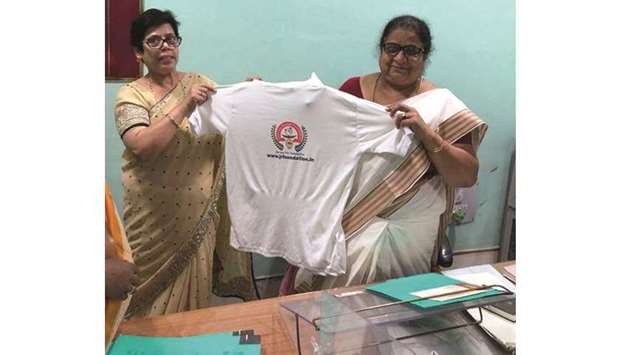Jyotshna Ranjan Foundation (JRF) is a voluntary organisation carrying out social and philanthropic works in India that stands on its own. The organisation is managed and supported by Jyotshna Ranjan, a Doha-based Indian expatriate.
Recently, Community spoke to her about the new heights of charitable giving.
Tell us about yourself and JRF.
I come from Bihar, an eastern state of India. Life has shown us (she and her husband Sanjeev Kumar) many events that propelled us to devote ourselves to the community service. We are extending a hand in order to build a foundation for the underprivileged. We enable the downtrodden to dare and dream big. The foundation provides scholarship to the deserving students of different engineering institutes in Bihar and Jharkhand areas in order to meet at least some portion of their educational expenses.
JRF believes in starting with one person and continuing the legacy with all like-minded people, who can dare to be compassionate, self-sacrificing and tender-hearted. We support the needy students financially in order to tap their potential and to contribute to the society. JRF has also been sponsoring the deprived and orphans with medical care items and educational resources. JRF even keeps on helping schools that are deprived of clean drinking water and other basic amenities. Our flagship programme is about providing eye-care to the children, especially for cataract operations.
Serving the society and doing gives a feeling of satisfaction. Adding philanthropists with JRF is another mission to carry forward the work. Many people have expressed their interest in joining our mission and supporting financially. However, JRF is self-sustaining and supporting entity. We do not accept financial aid.
How long have you been in Qatar? What have you been doing here?
We have been in Qatar since 2003. I have a passion for social service, so have been involved in philanthropic activities since a long time. My husband works as an Engineer with Qatar Petroleum.
How and when did you get the idea of starting the social work?
Bihar is a state where people are not very privileged. The state lacks the up-to-date infrastructure for quality education. The journey of my social work started with a domestic helper and her kid (10 to 12-year-old). The child was not attending school and had cataract. After much persuasion, the woman agreed to send her child to a school and get the cataract removed. We felt real sense of satisfaction after the successful operation of the boy.
What kind of work have you been carrying out? Why have you chosen a specific area?
JRF has specifically chosen to support and sponsor the girl child education, providing scholarships to the needy students. We also provide clean drinking water to many schools along with plantation in the rural areas. The organisation is registered with the state government. Recently, we went to a village near Patna for a plantation drive.
How living in Qatar has contributed towards your social work?
I am not employed. So, I have a lot of free time. I have both, the time and the peace of mind while living in Qatar. It has helped me a lot in making the right and beneficial decisions. I am a frequent traveller. I have to take care of both my family and community back in India as well.
What are your future plans for the work you have been carrying out in India?
I intend to set up a chain of devoted people in the society to help all the destitute and needy, especially younger generation to see that they are not deprived of the basic life facilities. I recently met Dilmani Mishra, Chairperson of Bihar Women Commission, at her Patna office, where we launched our organisation’s T-shirt. I have been receiving good support from the state government in India for my work.

